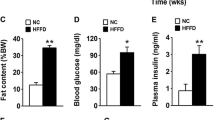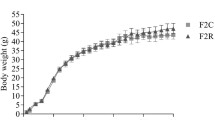Abstract
The maternal deficiency of vitamin D can act on organogenesis in mice offspring, being a risk factor for chronic diseases in adulthood. This study investigates the effects of maternal deficiency of vitamin D on structural islet remodeling and insulin-signaling pathway in the offspring. We studied male C57Bl/6 offspring at 3-month old (n = 10/group) from mother fed one of the two diets: control diet (C) or vitamin D-restricted diet (VitD−). After weaning, offspring only fed the control diet ad libitum. In the offspring, we studied insulin production, islet remodeling, and islet protein expression of the insulin-signaling pathway (Western blotting, isolated islet, n = 5/group). VitD− offspring showed greater glycemia (P = 0.012), smaller beta-cell mass (P = 0.014), and hypoinsulinemia (P = 0.024) than C offspring. Comparing VitD− offspring with C offspring, we observed lower protein levels in islet of insulin (P = 0.003), insulin receptor substrate-1 (P = 0.025), phosphatidylinositol-3-kinases (P = 0.045), 3-phosphoinositide-dependent protein kinase 1 (P = 0.017), protein kinase B (P = 0.028), with reduced expression of pancreas/duodenum homeobox-1 (PDX-1) (P = 0.016), glucose transporter-2 (P = 0.003), and glucokinase (P = 0.045). The maternal vitamin D-restricted diet modifies the development of the pancreas of the offspring, leading to islet remodeling and altered insulin-signaling pathway. The decrease of PDX-1 is probably significant to the changes in the beta-cell mass and insulin secretion in adulthood.






Similar content being viewed by others
Abbreviations
- 1,25(OH)2D3 :
-
1,25-Dihydroxyvitamin D3
- 25(OH)D:
-
25-Hydroxyvitamin D
- A[islet]:
-
Mean cross-sectional area of the islet
- AKT:
-
Protein kinase B
- AU:
-
Arbitrary units
- AUC:
-
Area under the curve
- BM:
-
Body mass
- C:
-
Control diet
- CYP27B1:
-
1-α-Hydroxylase, cytochrome p450 27B1
- FoxO1:
-
Forkhead transcription factor 1
- GLK:
-
Glucokinase
- GLUT:
-
Glucose transporter
- IRS-1:
-
Insulin receptor substrate-1
- M[islet]:
-
Islet mass
- OGTT:
-
Oral glucose tolerance test
- pAKT:
-
Phosphorylated protein kinase B
- PDK-1:
-
3-phosphoinositide-dependent protein kinase 1
- pFoxO1:
-
Phosphorylated forkhead transcription factor 1
- PDX-1:
-
Pancreas/duodenum homeobox-1
- PI3-K:
-
Phosphatidylinositol-3-kinases
- Q A[islet]:
-
Numerical density per area of the islet
- VDR:
-
Vitamin D receptor
- VitD− :
-
Vitamin D-restricted diet
- Vv:
-
Volume density
References
S. Mohammadian, N. Fatahi, H. Zaeri et al., Effect of vitamin d3 supplement in glycemic control of pediatrics with type 1 diabetes mellitus and vitamin d deficiency. J. Clin. Diagn. Res. 9, SC05–SC07 (2015)
F. Sundersingh, L.A. Plum, H.F. DeLuca, Vitamin D deficiency independent of hypocalcemia elevates blood pressure in rats. Biochem. Biophys. Res. Commun. 461, 589–591 (2015)
J.W. Bea, P.W. Jurutka, E.A. Hibler et al., Concentrations of the vitamin D metabolite 1,25(OH)2D and odds of metabolic syndrome and its components. Metabolism 64, 447–459 (2015)
A.W. Norman, J.B. Frankel, A.M. Heldt et al., Vitamin D deficiency inhibits pancreatic secretion of insulin. Science 209, 823–825 (1980)
P. Autier, Vitamin D status as a synthetic biomarker of health status. Endocrine 51, 201–202 (2016)
A.G. Pittas, S.S. Harris, P.C. Stark et al., The effects of calcium and vitamin D supplementation on blood glucose and markers of inflammation in nondiabetic adults. Diabetes Care 30, 980–986 (2007)
F.A. Nascimento, T.C. Ceciliano, M.B. Aguila et al., Transgenerational effects on the liver and pancreas resulting from maternal vitamin D restriction in mice. J. Nutr. Sci. Vitaminol. (Tokyo) 59, 367–374 (2013)
F.A. Nascimento, T.C. Ceciliano, M.B. Aguila et al., Maternal vitamin D deficiency delays glomerular maturity in F1 and F2 offspring. PLoS One 7, e41740 (2012)
S.R. Crozier, N.C. Harvey, H.M. Inskip et al., Maternal vitamin D status in pregnancy is associated with adiposity in the offspring: findings from the Southampton Women’s Survey. Am. J. Clin. Nutr. 96, 57–63 (2012)
M. Mojibian, S. Soheilykhah, M.A. Fallah Zadeh et al., The effects of vitamin D supplementation on maternal and neonatal outcome: a randomized clinical trial. Iran. J. Reprod. Med. 13, 687–696 (2015)
J. Jonsson, L. Carlsson, T. Edlund et al., Insulin-promoter-factor 1 is required for pancreas development in mice. Nature 371, 606–609 (1994)
A.M. Abuzgaia, D.B. Hardy, E. Arany, Regulation of postnatal pancreatic Pdx1 and downstream target genes after gestational exposure to protein restriction in rats. Reproduction 149, 293–303 (2015)
D. Accili, K.C. Arden, FoxOs at the crossroads of cellular metabolism, differentiation, and transformation. Cell 117, 421–426 (2004)
T. Kitamura, Y. Ido Kitamura, Role of FoxO proteins in pancreatic beta Cells. Endocr. J. 54, 507–515 (2007)
A.F. Burnol, L. Morzyglod, L. Popineau, Cross-talk between insulin signaling and cell proliferation pathways. Ann. Endocrinol. (Paris) 74, 74–78 (2013)
N. Hashimoto, Y. Kido, T. Uchida et al., Ablation of PDK1 in pancreatic beta cells induces diabetes as a result of loss of beta cell mass. Nat. Genet. 38, 589–593 (2006)
J. Avruch, Insulin signal transduction through protein kinase cascades. Mol. Cell. Biochem. 182, 31–48 (1998)
P.G. Reeves, F.H. Nielsen, G.C. Fahey Jr, AIN-93 purified diets for laboratory rodents: final report of the American Institute of Nutrition ad hoc writing committee on the reformulation of the AIN-76A rodent diet. J. Nutr. 123, 1939–1951 (1993)
S. Barbosa-da-Silva, J.C. Fraulob-Aquino, J.R. Lopes et al., Weight cycling enhances adipose tissue inflammatory responses in male mice. PLoS One 7, e39837 (2012)
E.D. Frantz, C. Crespo-Mascarenhas, A.R. Barreto-Vianna et al., Renin-angiotensin system blockers protect pancreatic islets against diet-induced obesity and insulin resistance in mice. PLoS One 8, e67192 (2013)
S.A. Tschanz, P.H. Burri, E.R. Weibel, A simple tool for stereological assessment of digital images: the STEPanizer. J. Microsc. 243, 47–59 (2011)
C.A. Mandarim-de-Lacerda, Stereological tools in biomedical research. An. Acad. Brasil. Cienc. 75, 469–486 (2003)
C.A. Mandarim-de-Lacerda, C.F. Santos, M.B. Aguila, Image analysis and quantitative morphology. Methods Mol. Biol. 611, 211–225 (2010)
E.D. Frantz, M.B. Aguila, A.R. Pinheiro-Mulder et al., Transgenerational endocrine pancreatic adaptation in mice from maternal protein restriction in utero. Mech. Ageing Dev. 132, 110–116 (2011)
D. Eyles, J. Brown, A. Mackay-Sim et al., Vitamin D3 and brain development. Neuroscience 118, 641–653 (2003)
H. Zhang, X. Chu, Y. Huang et al., Maternal vitamin D deficiency during pregnancy results in insulin resistance in rat offspring, which is associated with inflammation and Ikappabalpha methylation. Diabetologia 57, 2165–2172 (2014)
C. Reichetzeder, H. Chen, M. Foller et al., Maternal vitamin D deficiency and fetal programming—lessons learned from humans and mice. Kidney Blood Press. Res. 39, 315–329 (2014)
J. Bispham, D.S. Gardner, M.G. Gnanalingham et al., Maternal nutritional programming of fetal adipose tissue development: differential effects on messenger ribonucleic acid abundance for uncoupling proteins and peroxisome proliferator-activated and prolactin receptors. Endocrinology 146, 3943–3949 (2005)
J.A. Pasco, J.D. Wark, J.B. Carlin et al., Maternal vitamin D in pregnancy may influence not only offspring bone mass but other aspects of musculoskeletal health and adiposity. Med. Hypotheses 71, 266–269 (2008)
S.A. Clark, W.E. Stumpf, M. Sar, Effect of 1,25 dihydroxyvitamin D3 on insulin secretion. Diabetes 30, 382–386 (1981)
A. Vaidya, J.S. Williams, Vitamin D and insulin sensitivity: can gene association and pharmacogenetic studies of the vitamin D receptor provide clarity? Metabolism 61, 759–761 (2012)
J.L. Leahy, S. Bonner-Weir, G.C. Weir, Beta-cell dysfunction induced by chronic hyperglycemia. Current ideas on mechanism of impaired glucose-induced insulin secretion. Diabetes Care 15, 442–455 (1992)
K. Maedler, A. Fontana, F. Ris et al., FLIP switches Fas-mediated glucose signaling in human pancreatic beta cells from apoptosis to cell replication. Proc. Natl Acad. Sci. USA 99, 8236–8241 (2002)
H. Wolden-Kirk, L. Overbergh, C. Gysemans et al., Unraveling the effects of 1,25OH2D3 on global gene expression in pancreatic islets. J. Steroid Biochem. Mol. Biol. 136, 68–79 (2013)
C.C. Borges, A.F. Salles, I. Bringhenti et al., Adverse effects of vitamin D deficiency on the Pi3k/Akt pathway and pancreatic islet morphology in diet-induced obese mice. Mol. Nutr. Food Res. 60, 346–357 (2016)
F. Souza Dde, L.M. Ignacio-Souza, S.R. Reis et al., A low-protein diet during pregnancy alters glucose metabolism and insulin secretion. Cell Biochem. Funct. 30, 114–121 (2012)
J.H. Park, D.A. Stoffers, R.D. Nicholls et al., Development of type 2 diabetes following intrauterine growth retardation in rats is associated with progressive epigenetic silencing of Pdx1. J. Clin. Invest. 118, 2316–2324 (2008)
H. Hui, R. Perfetti, Pancreas duodenum homeobox-1 regulates pancreas development during embryogenesis and islet cell function in adulthood. Eur. J. Endocrinol. 146, 129–141 (2002)
Q. Cheng, B.J. Boucher, P.S. Leung, Modulation of hypovitaminosis D-induced islet dysfunction and insulin resistance through direct suppression of the pancreatic islet renin-angiotensin system in mice. Diabetologia 56, 553–562 (2013)
Y. Terauchi, Y. Tsuji, S. Satoh et al., Increased insulin sensitivity and hypoglycaemia in mice lacking the p85 alpha subunit of phosphoinositide 3-kinase. Nat. Genet. 21, 230–235 (1999)
X. Zhang, N. Tang, T.J. Hadden et al., Akt, FoxO and regulation of apoptosis. Biochim. Biophys. Acta 1813, 1978–1986 (2011)
J.A. Engelman, J. Luo, L.C. Cantley, The evolution of phosphatidylinositol 3-kinases as regulators of growth and metabolism. Nat. Rev. Genet. 7, 606–619 (2006)
R.L. Tuttle, N.S. Gill, W. Pugh et al., Regulation of pancreatic beta-cell growth and survival by the serine/threonine protein kinase Akt1/PKBalpha. Nat. Med. 7, 1133–1137 (2001)
W.H. Biggs 3rd, J. Meisenhelder, T. Hunter et al., Protein kinase B/Akt-mediated phosphorylation promotes nuclear exclusion of the winged helix transcription factor FKHR1. Proc. Natl Acad. Sci. USA 96, 7421–7426 (1999)
J.D. Johnson, N.T. Ahmed, D.S. Luciani et al., Increased islet apoptosis in Pdx1± mice. J. Clin. Invest. 111, 1147–1160 (2003)
H. Okamoto, J. Nakae, T. Kitamura et al., Transgenic rescue of insulin receptor-deficient mice. J. Clin. Invest. 114, 214–223 (2004)
T. Kitamura, Y.I. Kitamura, M. Kobayashi et al., Regulation of pancreatic juxtaductal endocrine cell formation by FoxO1. Mol. Cell. Biol. 29, 4417–4430 (2009)
Acknowledgments
We thank Thatiany Marinho, Aline Penna, Gezileia Lau, and Michele Soares for the technical assistance.
Funding
This work was supported by CNPq (Conselho Nacional de Desenvolvimento Científico e Tecnológico of Brazil) and FAPERJ (Fundacao de Amparo a Pesquisa do Estado do Rio de Janeiro of Brazil).
Author information
Authors and Affiliations
Corresponding author
Ethics declarations
Conflict of interest
None of the authors report any conflict of interest.
Electronic supplementary material
Below is the link to the electronic supplementary material.
Rights and permissions
About this article
Cite this article
Maia-Ceciliano, T.C., Barreto-Vianna, A.R.C., Barbosa-da-Silva, S. et al. Maternal vitamin D-restricted diet has consequences in the formation of pancreatic islet/insulin-signaling in the adult offspring of mice. Endocrine 54, 60–69 (2016). https://doi.org/10.1007/s12020-016-0973-y
Received:
Accepted:
Published:
Issue Date:
DOI: https://doi.org/10.1007/s12020-016-0973-y




